#(queer coded characters too for that matter)
Text

hehehe
#milgram#project sekai#kazui mukuhara#shidou kirisaki#mizuki akiyama#0507#kazushidou#me when the heavily queer coded character is also cat :3 themed#actually i've also drawn rui in kazui's suit too cuz he's :3 too#also obligatory old man yaoi i love them so much have i said that already#basically the scenario i imagined was shidou talking himself down or feeling guilty for still being alive/wanting to live#and then kazui just grabs him and is like “shut up don't say that you matter and i llllllike you. like. platonic. totally"#shidou is like :‚‚^(#but also a part of him probably feels nice to have someone care that much about him#anwyays i hate side profiles vomits everywhere#chibi's art/rkgk
72 notes
·
View notes
Text
I’m back on Tumblr, so it’s time to talk about GAY FROZEN! The movie is gay. All of it.
Okay, not all of it. But a lot of it!
Daily reminder as I yeet myself back onto Tumblr that Elsa is freaking gay okay? That’s how we’re gonna start this and the main thesis of this bullcrap will be Elsa’s obvious gayness.
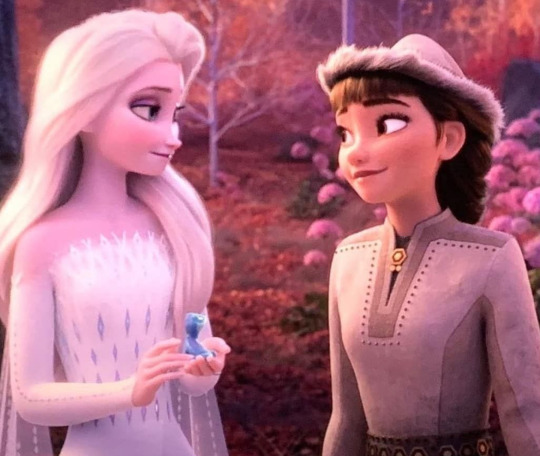
I’m sorry, but in this scene (only moments before Elsa is shown talking to Honeymaren while holding her hand and gazing at her face) there is clearly some gay stuff going on. Note the absolute HOPEFULNESS on Honey’s face when she looks at Elsa and says “you belong here, you know?” in an extra hopeful tone? And the way Elsa actually does stay there with her?!
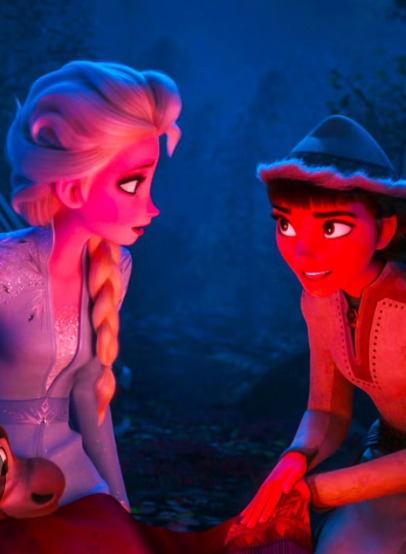
And earlier in the movie when they’re talking to each other it looks just like that scene from Tangled where Rapunzel is talking to Eugene! If it was a girl or boy the calm and wholesome way they talk to each other while maintaining steady eye contact and all that wholesome stuff would be read as a romantic connection, yet here it’s just shrugged off by the people who watched it as friendship. Yes, it could be that, but it also could be more and y’all aren’t even willing to suggest that alternative simply because they’re both girls.
Let’s talk about Oaken! He’s gay and has a husband and kids, and it’s clearly seen in the first movie.
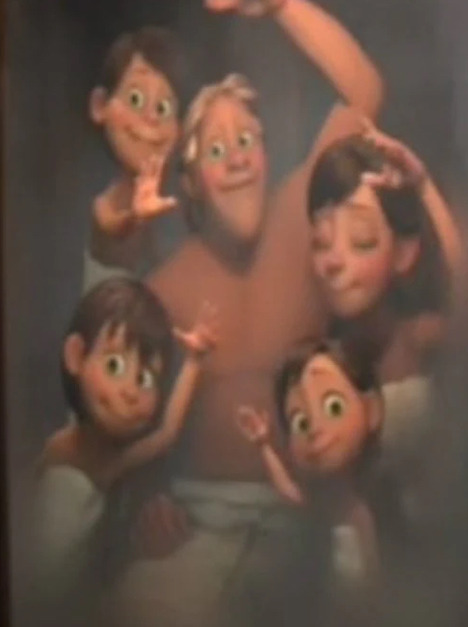
Yes, I’m aware the tall girl with brown hair could be his (snore) wife. But all the kids honestly look more like the possible mother other than the blonde hunk, so it doesn’t make too much sense. If that woman was the wife and mother, why does she look just like all her kids except one, and the one doesn’t even look like her or Oaken? It would make much more sense if the blonde guy, who looks older anyway, was his husband and the kids were adopted. Yes, realistic genes usually don’t mean much in animated films, but then why are Elsa and Anna and their family designed to look related? And Honeymaren and Ryder from Frozen 2 look related as well. So yeah.
BACK TO ELSA! So, you see, if Oaken is gay, it would be perfectly reasonable for her to be given if this is true the franchise has tackled gay characters before. A gay Disney Princess would be awesome and given the first two movies showcased Elsa’s own personal journey and journey to mend her relationship with her sisters, a third movie could in turn have her beginning a romantic relationship with someone who very well may be a woman, and very may well be Honeymaren given the way they behave in the second movie. It seems to me like the Frozen 2 interactions are like Raya and Namaari from Raya and the Last Dragon— homoerotically toned friendships that seem to all but outright say that the two characters are gay. Except with Honeymaren and Elsa their friendship is shown a lot less given the movie is about Elsa’s self discovery. Unless, you know, Frozen 2 is merely setting up the building blocks for them to get in a relationship later. A girl can dream.
Did any of that make sense? I hope so. Because come on, Disney. A lot of people don’t like you know and some of your actions have gone to crap, but you can at least try to fix things by ceasing to support genocide and just maybe hearing us out and giving us a gay Disney Princess— hopefully Elsa, because that girl is gay-coded as all hell.
#elsa#queen elsa#current mood#elsa of arendelle#frozen#frozen 2#frozen 3#honeymaren#gay#lgbtq#I WANT A GAY DISNEY PRINCESS#elsa is so queer coded#elsamaren#when is frozen 3??#please please please just make a gay character who isn’t just implied to be but who is stated to be come on please we need it#representation matters#elsa is a queer icon#lesbians#i mentioned namaari and raya and Disney better make them a thing too#all the hashtags. ever.#read this big long post please thank you#reblog this post so Disney can see it please okay I want gay elsa#But it makes so much sense for her to be gay so I’m not just whining#Maybe I’m whining just a bit#…#frozen is the best movie ever
25 notes
·
View notes
Text
(( this is the only critical thing I'm going to say about the show here because there's already a lot of negativity and I'm actually very happy for the people who enjoyed it 💚 ))
With how rushed the season was they could have definitely had Guz Khan (Ivan) as a background character again. There are already so many characters it wouldn't really make a difference.
I don't know what the budget was, and maybe there really was absolutely no way to accommodate another actor, but they also chose to kill him off screen? They could have said he chose to run away, escaped on a dinghy or something silly, and then we could have had him back if they give S3 a larger budget.
This is all to say I hope he isn't actually dead and comes back for season 2 as a badass captain to help them kill off the British ✌️
#“he was just a background character it doesn't matter that he died”#it doesn't matter TO YOU#some of us watch the show for the secondary characters hahah#i don't think that's a weird concept#part of the queer experience has always been focusing too much on a queer coded character that's not the protagonist#he was so cool and they killed him off of screen#he was fang's best friend!!#he was like ten minutes on screen last season and he still was so so funny#anyway no more negativity here#this is my safe space ship where we think about Jim climbing things#ofmd#our flag means death#ofmd s2 spoilers#our flag means death s2 spoilers#ivan ofmd#guz khan#ofmd critical
25 notes
·
View notes
Text
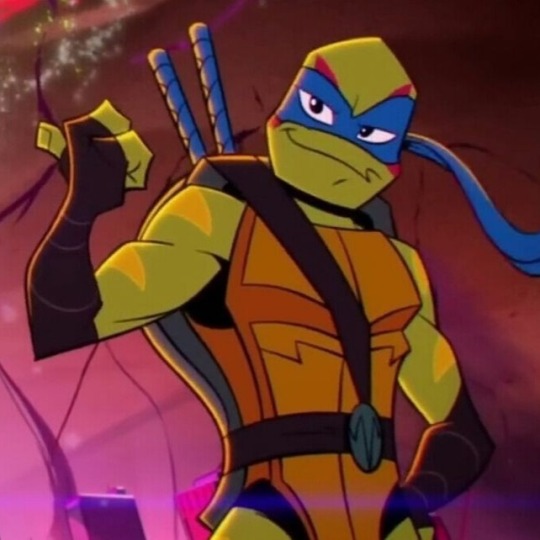

once again comparing two characters from different franchises simply bc they have the same vibes
#i promise these make sense#at least to me#thats all that matters idc#okay but like cmon#both blue coded characters who have insecurities but often try to hide them by being overconfident#and both of them had questioned their place on their team at some point#AND they both sacrificed themselves too but fortunately didn't die#and i guess theyre both very queer anyways#bat talks
9 notes
·
View notes
Text
Good afternoon! What kind of characters or tropes do you wish you could see more of?? [Ex. More Trans characters; More witches; More himbos]
AND/OR: What kind of characters or tropes would you like to see LESS of? [Ex. Less Trans characters who have to live lives of misery; Less "evil" witches; Less characters played by Mark Wahlberg]
AKA what i need in my life are anti-capitalist trans witches who live lives of joy and community and also some himbos are there! HELL YEAH!!! ....... *ahem*. You don't have to be that specific, but hopefully you get the idea!
#original#writing#character design#the blacksmith#this is not the first time i have asked this and it won't be the last#but i wanna know what would make people feel seen and joyful in a way they rarely get to be#or just tropes that people enjoy#gives me a direction to walk in while i brainstorm characters i will love and others will love#for me i want to see sexy fat characters and characters who find healing and safe homes after trauma and trans characters#but also i wanna see himbos and farces and queer-coded queer villains!#i want transgender witches and autistic knights. and i want to know what people DON'T WANT too#and when i make a character who is in a group i am not in then it matters ENORMOUSLY that i am respectful and educated in doing so#which is my responsibility and i will hold myself to it.#what is the point of making characters like me to make myself feel seen if other characters feel like punches down???#it is a book about kindness and that sounds like something i must take every measure to avoid#i can't please everyone but that isn't the point.#the point is the difference between a fist punching down and a hand reached out to help lift a comrade up.#the point is the kind of person I want to be at the end of the day.#sometimes i may look an ignorant fool but so help me gods i will not stay that way and I will work to do no harm as I learn!#i will work to do better until the day i die or else i am not Jack Goodfellow. and as i AM him... well. my work is cut out for me!#I JUST. CARE. A LOT. ABOUT. KINDNESS AND STORYTELLING. IN THAT ORDER.#AHHHHHHHHHH
3 notes
·
View notes
Text
Will we ever get anything quite like Code Geass again?
I don't think it's possible.
Code Geass is Japanese nationalist propaganda disguised as a global political drama, disguised as a military mecha show, disguised as yaoibait, disguised as a teen melodrama, disguised as a high school romcom, disguised as a Pizza Hut commercial...
...except those layers aren't layers at all, but are instead comingled in a giant snake ball of insanity.
The lead writer, Ichirō Ōkouchi, only ever worked as an episode writer for other shows prior to Code Geass, and never took the helm of an anime series ever again. And it shows. [EDIT: Several people have pointed out his other lead writing credits to me. So I misread Wikipedia—sue me. I maintain that this guy is a better episode writer than he is a lead writer.]
The minute-to-minute pacing is impeccable from a mechanical standpoint, with tension and stakes rising to ever-higher peaks, balanced out by the slow simmers of the b-plot and c-plot. It keeps the viewer on the edge of their seat at all times. Meanwhile, the large-scale plot is the most off-the-wall middle school nonsense I've ever seen, continually surprising the viewer by pulling twists too dumb to have ever have been on their radar—and therefore more effective in terms of raw shock value.
"Greenlight it!" was the mantra of this anime's production. It must have been. It has, in no particular order, all of the following:
Character designs from CLAMP, the foremost yaoi/BL group in Japan at the time—for characters who are only queer insofar as they can bait the audience, and only straight insofar as they can be more misogynist to the female cast.
Speaking of the female cast, hoo boy the fanservice. We've all seen anime girls breast boobily, with many cases more egregious than Code Geass, but there's something special about it happening immediately after—or sometimes in the middle of!—scenes of military conflict and ethnic cleansing.
Pizza Hut product placement everywhere, in every conceivable situation. High-speed chases, light slice-of-life scenes, intimate character moments, all of it. Gotta have Pizza Hut.
The anime-only Pizza Hut mascot, Cheese-kun. He wears a fedora.
The most hilarious approximations of European names—which I would love to see more often, frankly. Names like, I dunno, "Count Schnitzelgrübe zi Blanquezzio."
A depiction of China that is wholly removed from any modern reality, with red-and-gold pagodas, ornamental robes, scheming eunuchs, and a brainwashed child empress. There's a character named General Tsao, like the chicken.
Inappropriate free-form jazz in the soundtrack, intruding at the most unexpected times.
A secret cabal not unlike the Illuminati, run by an immortal shota with magic powers, holding influence all across the world, at the highest levels of government. They matter for approximately three episodes.
An unexpected insert scene of a schoolgirl using the corner of a table to masturbate. She's doing it to thoughts of her crush, the princess Euphemia—because she believes Euphemia to be as racist as she herself is, and that gets her off. This interrupts an unrelated scene of our protagonist faction planning their next move, which then resumes as if uninterrupted.
Said schoolgirl, in a fit of hysteria, threatens to detonate a worse-than-nuclear bomb in the middle of her school. She then goes on to develop an even more destructive version of that bomb, and become a war criminal, in a chain of cause-and-effect stemming from the moment she finds out that Euphemia wasn't actually that racist.
A character called "the Earl of Pudding."
A premise that asks us to believe that the name Lelouch is normal enough that he didn't need to change it when he went into hiding as an ordinary civilian. "No, that's not Prince Strimbleford von Vanquish! That's our classmate, Strimbleford Smith."
The collective unconscious, a la Carl Jung, within which the protagonist fights his villainous father for control over the fate of humankind. After this is over, the anime just keeps going for about ten more episodes.
An episode in which a mech tosses a giant pizza.
A gay yandere sleeper agent who can manipulate the perception of time.
Chess being played very badly, even to the untrained eye. Lelouch frequently checkmates his opponent by moving his king. This goes hand-in-hand with the anime's crock of bad chess symbolism.
A fictional drug that can most succinctly be described as "nostalgia heroin."
Roller-skating mecha in knightly armor, and some of the most sickass mecha fight choreography that I've seen.
I could go on and on, but I think you get the picture. This anime is what the average Westerner in 2006 thought anime was, and it was made in a confluence of factors that cannot be replicated. I've never had so much fun watching something that I found so... insulting. Repugnant. Ridiculous. Baffling. I love it sincerely.
Catch me cosplaying Lloyd Asplund at a con sometime, or maybe even the big gay loser himself, Lelouch vi Britannia.
#code geass#anime#lelouch vi britannia#rolo lamperouge#nina einstein#kallen kozuki#lelouch lamperouge#clamp manga#lloyd asplund
4K notes
·
View notes
Text
ultrakill really does raise the bar for queer coding im not gonna sugarcoat it to you. i think if you’re not going to outright say that two characters have an insanely gay homoerotic rivalry or have them kiss on screen to the audience then you as a creator have a responsibility to let your audience know of your intentions whether through haha funny jokes or seriously telling homophobes to gtfo. im 100% serious on this. it especially matters if you’re inhabiting an insanely cishet masculine genre like FPS games too
606 notes
·
View notes
Text
I need people to understand how S&P (standards and practices) works in television and how much influence they have over what gets to stay IN an episode of a show and how the big time network execs are the ones holding the purse strings and making final decisions on a show's content, not the writers / showrunners / creatives involved.
So many creators have shared S&P notes over the years of the wild and nonsensical things networks wanted them to omit / change / forbid. Most famously on tumblr, I've seen it so many times, is the notes from Gravity Falls. But here's a post compiling a bunch of particularly bad ones from various networks too. Do you see the things they're asking to be changed / cut ?
Now imagine, anything you want to get into your show and actually air has to get through S&P and the network execs. A lot of creators have had to resort to underhanded methods. A lot of creators have had to relegate things to subtext and innuendo and scenes that are "open to interpretation" instead of explicit in meaning. Things have had to be coded and symbolized. And they're relying on their audience to be good readers, good at media literacy, to notice and get it. This stuff isn't the ramblings of conspiracy theorists, it's the true practices creatives have had to use to be able to tell diverse stories for ages. The Hays Code is pretty well known, it exists because of censorship. It was a way to symbolize certain things and get past censors.
Queercoding, in particular, has been used for ages in both visual media and literature do signal to queer audiences that yes, this character is one of us, but no, we can't be explicit about it because TPTB won't allow it. It's a wink-wink, nudge-nudge to those in the know. It's the deliberate use of certain queer imagery / clothing / mannerisms / phrases / references to other queer media / subtle glances and lingering touches. Things that offer plausible deniability and can be explained away or go unnoticed by straight audiences to get past those network censors. But that queer viewers WILL (hopefully) pick up on.
Because, unfortunately, still to this day, a lot of antiquated network execs don't think queer narratives are profitable. They don't think they'll appeal to general audiences, because that's what matters, whatever appeals to most of the audience demographic so they can keep watching and keep making the network more money. The networks don't care about telling good stories! Most of them are old white cishet business men, not creatives. They don't care about character arcs and what will make fans happy. They don't care about storytelling. What they care about is profit and they're basing their ideas of what's profitable on what they believe is the predominate target demographic, usually white cis heterosexual audiences.
So, imagine a show that started airing in the early 2000s. Imagine a show where the two main characters are based on two characters from a famous Beat Generation novel, where one of the characters is queer! based on a real like bisexual man! The creator is aware of this, most definitely. And sure, it's 2005, there's no way they were thinking of making that explicit about Dean in the text because it just wouldn't fly back then to have a main character be queer. But! it's made subtext. And there are nods to that queerness placed in the text. Things that are open to interpretation. Things that are drenched in metaphor (looking at you 1x06 Skin "I know I'm a freak" "maybe this thing was born human but was different...hated. Until he learned to become someone else.") Things that are blink-and-you-miss-it and left to plausible deniability (things like seemingly spending an hour in the men's bathroom, or always reacting a little vulnerable and awkward when you're clocked instead of laughing it off and making a homophobic joke abt it)
And then, years later there's a ship! It's popular and at first the writers aren't really seriously thinking about it but they'll throw the fans a bone here and there. Then, some writers do get on the destiel train and start actively writing scenes for them that are suggestive. And only a fraction of what they write actually makes it into the text. So many lines left on the cutting room floor: i love past you. i forgive you i love you. i lost cas and it damn near broke me. spread cas's ashes alone. of course i wanted you to stay. if cas were here. -- etc. Everything cut was not cut by the writers! Why would a writer write something to then sabotage their own story and cut it? No, these are things that didn't make it past the network. Somewhere a note was made maybe "too gay" or "don't feed the shippers" or simply "no destiel."
So, "no destiel." That's pretty clearly the message we got from the CW for years. "No destiel. Destiel will alienate our general audience. Two of our main characters being queer? And in a relationship? No way." So what can the pro-destiel creatives involved do, if the network is saying no? What can the writers do if most of their explicit destiel (or queer dean) lines / moments are getting cut? Relegate things to subtext. Make jokes that straight people can wave off but queer people can read into. Make costuming and set design choices that the hardcore fans who are already looking will notice while the general audience and the out-of-touch network execs won't blink and eye at (I'm looking at you Jerry and your lamps and disappearing second nightstands and your gay flamingo bar!)
And then, when the audience asks, "is destiel real? is this proof of destiel?" what can the creatives do but deny? Yes, it hurts, to be told "No no I don't know what you're talking about. There's no destiel in supernatural" a la "there is no war in Ba Sing Se" but! if the network said "no destiel!" and you and your creative team have been working to keep putting destiel in the subtext of the narrative in a way that will get past censors, you can't just go "Yes, actually, all that subtext and symbolism you're picking up, yea it's because destiel is actually in the narrative."
But, there's a BIG difference between actively putting queer themes and subtext into the narrative and then saying it's not there (but it is! and the audience sees it!) versus NOT putting any queer content into the text but SAYING it is there to entice queer fans to continue watching. The latter, is textbook queerbaiting. The former? Is not. The former is the tactics so many creatives have had to use for years, decades, centuries, to get past censorship and signal to those in the know that yea, characters like you are here, they exist in this story.
Were the spn writers perfect? No, absolutely not. And I don't think every instance of queer content was a secret signal. Some stuff, depending on the writer, might've been a period-typical gay joke. These writers are flawed. But it's no secret that there were pro-destiel writers in the writing room throughout the years, and that efforts were made to make it explicitly canon (the market research!)
So no, the writers weren't ever perfect or a homogeneous entity. But they definitely were fighting an uphill battle constantly for 15 yrs against S&P and network execs with antiquated ideas of what's profitable / appealing.
Spn even called out the networks before, on the show, using a silly example of complaints abt the lighting of the show and how dark the early seasons were. Brightening the later seasons wasn't a creative choice, but a network choice. And if the networks can complain abt and change something as trivial as the lighting of a show, they definitely are having a hand in influencing the content of the show, especially queer content.
Even in s15, (seasons fifteen!!!) Misha has said he worried Castiel's confession would not air. In 2020!!! And Jensen recorded that scene on his personal phone! Why? Sure, for the memories. But also, I do not doubt for a second that part of it was for insurance, should the scene mysteriously disappear completely. We've seen the finale script. We've seen the omitted omitted omitted scenes. We all saw how they hacked the confession scene to bits. The weird cuts and close-ups. That's not the writers doing. That's likely not even the editors (willingly). That's orders from on high. All of the fuckery we saw in s15 reeks of network interference. Writers are not trying to sabotage their own stories, believe me.
Anyways, TLDR: Networks have a lot more power than many think and they get final say in what makes it to air. And for years creative teams have had to find ways to get past network censorship if they want "banned" or "unapproved" "unprofitable" "unwanted" content to make it into the show. That means relying on techniques like symbolism, subtext, and queercoding, and then shutting up about it. Denying its there, saying it's all "open to interpretation" all while they continue to put that open to interpretation content into the show. And that's not queerbaiting, as frustrating as it might be for queer audiences to be told that what they're seeing isn't there, it's still not queerbaiting. Queerbaiting is a marketing technique to draw in queer fans by baiting them with the promise of queer content and then having no queer content in said media. But if you are picking up on queer themes / subtext / symbolism / coding that is in front of your face IN the text, that's not queerbaiting. It's there, covertly, for you, because someone higher up didn't want it to be there explicitly or at all.
#long post#LONG-ass post#but it needed to be said!#i'm sorry if you think every creative involved with spn was a braindead asshole but the thing is.#even the most mediocre of writers understands a thing or two abt symbolism and writers working in TV are plagued by S&P#countless writers have talked abt the S&P bullshit and having to tweak and edit down their work to get past censors#it's a reality of writing for television#and the people who understand all this and understand the context of making TV in the early 2000s (to present tbh!) aren't 'delusional'#i'm sorry but it's naive to think that queer stories and queer characters are free to be told even nowadays. it's still a constant battle#times have changed but unfortunately not as much as you'd think#the confession !!!!! the confession still struggled to air and what we got was so obviously hacked down to bits!!!!!!#how can anyone think getting destiel content into the show was ever easy?#how can anyone think the pro-destiel writers weren't constantly having to be careful and underhanded in their writing?#there's a reason queercoding and subtext exist and it's this!!! it's censorship from TPTB#anyways. people much older than me have been talking abt this for ages. younger fans who are used to more open queer rep need to understand#it hasn't always been that easy and even nowadays SO many networks are still not willing to take a risk on queer stories#so creators do what they can#vic.txt
314 notes
·
View notes
Text

LET’S TALK ABOUT EXPLORING LOKI & MOBIUS THROUGH THE LENS OF QUEER EXPERIENCE
Thank you for this request, @nabananab
Before I dig into this juicy ask, I think it’s important to note (however obvious the fact maybe) that an individual’s unique engagement with art is an inherent and integral part of art. The intention of the artist and the sociopolitical influence of culture, while important in our interpretation of a work, are not the sole source of drawing the work’s meaning. We are all artists in one form or another. I consider myself one of the pen, and nothing is more important to me than art giving someone a sense of emotional connection. I should hope other artists would agree, and for this reason I am an ardent believer in art taking on a life of its own once it has been created. The creator’s word, while it matters to some degree, does not supersede an individual’s relationship with the creation. Our histories, our desires, our fears, our likes, our dislikes, indeed our infiniteness as fragile human beings, allow us to create an elevated, spiritual interpretation beyond the confines of original intent. With art, there is no such thing as “reaching” or “reading too deeply”.
I leave this message with all of you as we look at these beloved characters through the lens of queer experience.
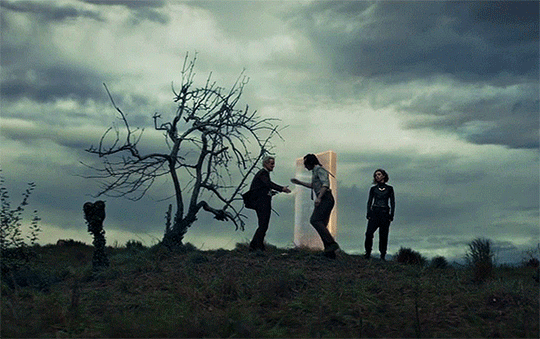
LOKI
Culture influences what we see and hear, which in turn influences artistic portrayal. Setting aside Norse myth, Marvel’s Loki is a classic example of a queer-coded villain (later canonized as a queer antihero). Deception, daggers, sexual temptation, transformation, and magic are all culturally tied to the “immoral” facets of femininity. Just as a strong, independent woman untethered to the control of man is deemed a “wicked woman”, a man demonstrating gender ambiguity and like qualities is similarly judged. Only masculinity is viewed as pure and good, and this no doubt was—and continues to be—a key force in white, western colonization’s destructiveness. It all but crushed our rich global history of divine femininity, gender diversity, and romantic and sexual expression.
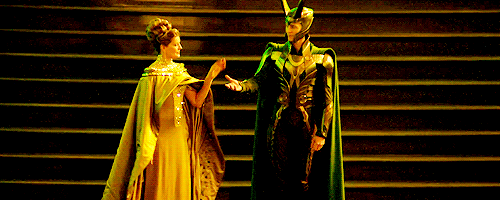
Asgard, as Marvel portrays it, is without a doubt a masculine-dominant warrior society. Only two women feature prominently: Queen Frigga and Lady Sif. Whereas Sif embraces her masculine qualities and fits in easily with Thor and the Warriors Three, Queen Frigga embraces her feminine powers, though her authority is submissive to the All-Father, Odin. Her influence is most heavily seen in her adopted son, Loki, with whom she shared and taught magic in hopes that Loki might “feel some sun on himself” despite the “long shadows [Thor] and [Odin]” cast. The magic that Frigga gifts Loki, however, attracts scorn. The subtext here is that Loki’s specialness, his individuality, comes from feminine powers despite presenting as a man, and a gender ambiguous one at that. Unlike Thor and Odin, he is not masculine. While strong, he does not exhibit Thor’s brute strength. He is cautious, thoughtful, another feminine quality, whereas Thor’s courageousness often veers toward foolhardy and brash.
Thus, if Loki cannot be loved and accepted as he is (a queer person of another race), he will force love and acceptance through the power of the throne. Kings oft inspire fear, coercing subjects to love them whether they wish to or not. But we know Loki never truly wanted the throne. The throne is a mere distraction from, perhaps even a poor replacement for, what he truly wants: genuine love and acceptance that cannot be bought. Unfortunately, Loki believes he will never get these things, which is why, when Mobius questions him, Loki’s desire for control (Loki, King of the Midgard; Loki, King of the Nine Realms; Loki, King of Space) can never be satiated. Mobius challenges Loki for the exact purpose of revealing this to him. What do you really want? At this point, Loki does not have the words to form an answer. In S2E5, Syvlie raises the question Mobius originally asked in S1E1. It is then, after experiencing Mobius’s friendship and the other relationships that come to being as a result (including Sylvie’s), that Loki can articulate his answer.
Loki’s othering, even before the discovery of his true identity as a Jotun (an allegory for a villainized foreign race), creates a lonely environment in which Loki’s potential for goodness is quashed by centuries of resentment, bitterness, and jealousy. His attempts at masculinity take the form of violence, all of which are, as Loki admits in S1E1, “part of the illusion; the cruel elaborate trick conjured by the weak to inspire fear.”
Loneliness and the desire for love and acceptance are a universal human experience, but they are felt far more acutely within our intersectional queer communities.
MOBIUS
His fascination with Loki is compelling because there are many things we can infer about its reasons. The first, most obvious explanation is Mobius’s “soft spot for broken things”, which is in some ways tied to his qualities as a compassionate, forgiving, and supportive father. A secondary explanation is a wish for partnership. We know from S1 that Mobius’s friendship with Ravonna spanned eons. We later learn in S2E6 that he and Ravonna started out as peers, hunters. They were partners on the field, but where Mobius “failed” because of his humanity, Ravonna “advanced” because of her ruthlessness. This change in relational dynamics left him partner-less. Finally, a third, less obvious reason is Mobius’s desire to express himself in ways Loki does so effortlessly. That desire may come from the suppression and repression of his own softspoken queerness in order to survive the fascist culture of the TVA.
Mobius is captivating for many reasons. Whereas Loki is a textbook example of culture viewing “queerness as evil”, “queerness as flamboyance”, “queerness as stylishness”, “queerness as loudness”, “queerness as sexual promiscuity and deviance”, “queerness as chaos”, Mobius very much aligns with the image of a straight-passing, repressed queer individual. This is an identity that does not get as much attention or presence in artistic media as it deserves, for there are many who need this representation to reflect them. He is not stereotypically queer by any means: he is not colorful. He is not stylish, flamboyant, or loud. His sex appeal primarily derives from the viewers’ attraction to his personality, though it certainly helps that Owen Wilson is quite handsome.
Combine these three reasons, and it becomes easy to see how a character (or person!) like Mobius might fall in love with a character (or person!) like Loki.
There is a certain amount of beautiful irony in how Loki and Mobius affect one another and consequently their identities. Mobius, feeling compassion toward an individual who has been brutally othered and oppressed, seeks to free Loki from the confines of his narrative, as determined by the “Time Keepers”. The only feasible way to do this is to bring a variant of Loki out of the timeline and into the TVA. Mobius then provides Loki with the opportunity to change by: acknowledging Loki’s strengths, giving Loki the chance to use his strengths in productive ways, praising Loki when he does well, listening to Loki, believing in Loki, calling out Loki, and accepting Loki as he is, with all his history, without judgement. Mobius does not try to force change like Thor or Odin. Rather, he creates an environment in which change could happen naturally. This kindness and, indeed, what becomes unconditional love by the end of S1E4, allows Loki to embrace his authentic queerness with self-love and use his feminine powers for altruism rather than masking them with self-hatred and masculine rage.
FREEING LOKI
In S1E1, Mobius is enthralled with Loki’s hijinks as the handsome, charming, devil-may-care, D.B. Cooper. This minor escapade in Loki’s life, which was likely only intended for laughs by the writer, reveals something interesting about Mobius: Loki’s mischievousness, his magic, his cunning, are all quite endearing to him when no real harm is being inflicted. That is, Loki, when not under duress, is someone to be admired when he’s being himself. We admire in people what we wish we had in ourselves, and this, at times, may lead to powerful attraction.
Loki, for his part, does much the same for Mobius. The environment (the TVA) which allowed Loki to thrive is also the same environment that has abused and constrained Mobius.
The heat that Ravonna presses upon Mobius, however, changes his tone with Loki himself. When Loki asks Mobius why he “[sticks] his neck out for [him]”, Mobius provides Loki with two options to choose from: “A. He sees a scared little boy shivering in the cold, or B. He will say whatever he needs to say to get the job done”. Option A, while insulting, has compassion layered beneath the barb. Loki, an expert at cloaking truth with meanness, sees through this and indirectly chooses what he believes to be true in the cafeteria scene: that Mobius feels sympathy for Loki’s painful childhood. The subtext of this acknowledgement is that the true means to the end is reversed: Mobius doesn’t need Loki to catch the Variant on the timelines. Mobius needs the Variant to free Loki from the timelines. The Variant is an excuse and another agent of poetic irony: when Sylvie unleashes the multiverse, she literally frees Loki of his predetermined narrative.
The conceit of S1E1 is that Mobius intends to use Loki for the “good” of the Sacred Timeline. It is important to remember that characters, while not real, are meant to mirror human complexity. Multiple, seemingly conflicting things may be true concurrently. In S1E2, we see in Mobius’s conversations with Ravonna that he deeply believes in Loki’a capacity to be a wonderful person and wants him to have the opportunity to change. His enthusiasm for these things outshines his desire to catch Sylvie.

And, because the Variant is Loki, because Sylvie is Loki, because, as she says, “[they] are the same”, Mobius’s own freeing of Loki, his unconditional love for him, cascades from Loki to Sylvie. Sylvie would not be free to live as she pleases if not for Mobius’s compassion for Loki in the first place.
In S1E4, Loki reveals the TVA’s sham. Mobius’s sense of self becomes fragile alongside his sense of partnership with Loki. But because of our sociopolitical culture’s influence on capitalism, the creative voices of the Loki series self-censures what could be (what is) a queer romance. This self-censureship makes itself known in Mobius’s own self-censureship. His jealousy and heartbreak cannot be spoken directly. It must be spoken through the words of a woman, someone who presents as the opposite sex. Through a looping memory of a scornful Sif telling Loki, “You are alone and always will be”, Mobius makes known the nature of his feelings for him.
BUT WHO WILL FREE MOBIUS?
In the same cafeteria scene in S1E2, Loki asks Mobius if he’s ever ridden a jet ski. Mobius’s response is demure, saying him riding one would “cause a branch for sure”. The jet ski gives the audience another clue as to what Mobius seeks in life: something fun, thrilling, and reckless. Yet Mobius sets aside his desires for what he believes is for the good of the TVA, and thus humanity. This suppression and repression of authentic selfhood mirrors the queer experience of living within a heteronormative culture, especially one with religious doctrines that equate pleasure with sinfulness.
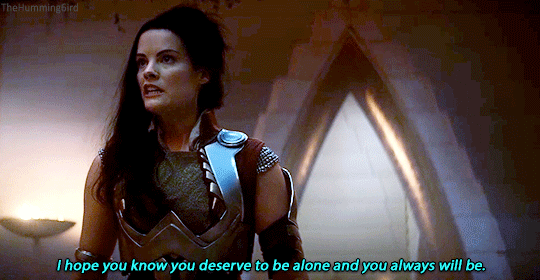
Because Mobius extended his heart, his partnership, his love (symbolized by twin daggers hidden in his locker [a closet]; notably a male phallic symbol of which there are a pair [partners]) and was soundly rejected, Mobius retaliates with the loneliness he himself feels. This loneliness may be interpreted as an allegory for the loneliness of being closeted as opposed to the loneliness of being out but othered.
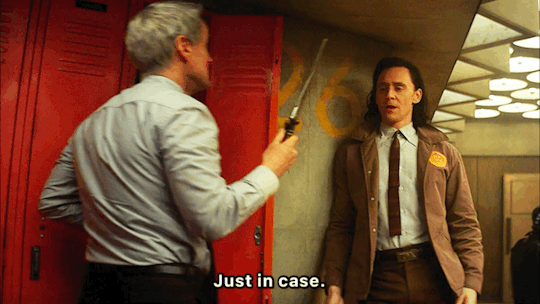
Ultimately, Mobius’s love for Loki shifts from selfish desire to unconditional love when he chooses to help Loki save Sylvie. In S1E5, it is conspicuous that after delivering Sylvie safely to Loki’s side, Mobius’s partings words are, “Guess you got away again”, to which Loki replies, “I always do”, which echos the lover’s trope of “the one that got away”.
[It drives me absolutely bananas that I can't find the specific gif I need when I literally saw it multiple times earlier this week but didn't need it THEN]
Owen’s acting choice is interesting here. He laughs, smiles, then looks down before looking up again, his eyes shifting from fondness to what feels like longing. Mobius extends his hand, a sensible choice for someone who believes his love is unrequited and is unsure of how Loki defines their relationship. Loki, appreciating what Mobius has done for him, closes the distance with an embrace and thanks Mobius for his friendship.
In S2E1, upon Loki’s time-slipping into the war room, whatever apprehensions Mobius had about physical contact was wiped away by the collapse of the TVA and the memory of Loki’s hug. In this scene, it becomes clear to Mobius that Loki is panicking. He makes the executive decision to use his physical contact as a grounding force, relocates Loki to a quiet environment, asks after Sylvie with no bitterness in his voice, then prioritizes Loki’s physical well-being. Perhaps, in Mobius’s view, his love is unrequited, but there is nothing in place to stop him from expressing that love more freely while honoring Loki’s feelings for Sylvie. This regard, which may be construed as platonic, may also be viewed romantic, courtly love.
The fight between Loki and Sylvie in S1E6 sets the stage for Mobius to receive Loki and become a refuge for heartbreak.
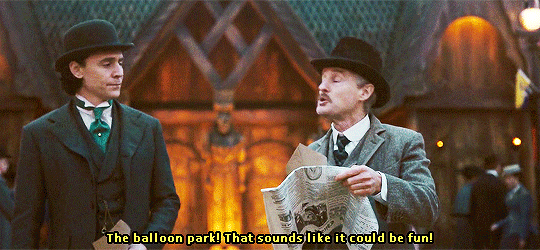
S2E2 and S2E3 has Loki’s and Mobius’s temperaments when it comes to investigating flipped. In S1, Mobius was focused on the mission and often had to reign in Loki. In S2, Mobius is more casual, more willing to take his time and enjoy the sleuthing as it unfolds, while Loki administers pressure to stay focused. The question is why?
In S2E2, Brad attacks Mobius’s sense of self. He points out how weird it is that Mobius is not at all curious about looking at his timeline and stresses that the TVA, and everything in it, isn’t real. Brad calls into question Mobius’s reason for staying. Knowing that the answer is Loki, we can surmise through the queer lens that Brad also corners Mobius into potentially outing himself in front of the object of his affections, someone he believes does not return his feelings, and whose knowledge of those feelings may threaten their friendship. This is a traumatic experience for queer people in the real world, and this extra layer of emotional conflict adds depth to Mobius’s violent response.
Mobius influenced Loki in a myriad of ways. One that has not been discussed yet is an appreciation for focus and order. Loki, in turn, has cracked the door open for Mobius to explore pleasure. We can speculate that, in his own way, Mobius is testing what happiness could look like living a life between the TVA and the timelines. For him, this means cocktails at the theater, cracker jacks, and exploring the World’s Fair, all of which are pleasurable on their own but are even more so with Loki’s company. His queerness, once again, is quiet, mundane, but playful in its own right, and finally brave enough to explore. These scenes suggest that Mobius is indeed happy at the TVA and, as we see in the finale, this happiness is solely rooted in his relationship with Loki and the emotional intimacy they share together.

Loki expresses concern for Mobius, noting that he has “never seen him like that before.” Mobius, interestingly, deflects every concern by absurdly blaming Loki: “He got under your skin”, “I was following you!” The psychological undercurrent here is that Loki is the reason why Brad got under Mobius skin. Loki is the person that Mobius will follow.
Loki takes Mobius’s distress in stride, responding in a way the Mobius normally would. However, Brad’s question piques his interest, and his own care for Mobius prompts him to gently challenge Mobius’s lack of interest in his own timeline. Mobius’s reason for avoidance is, “What if it’s something good?”
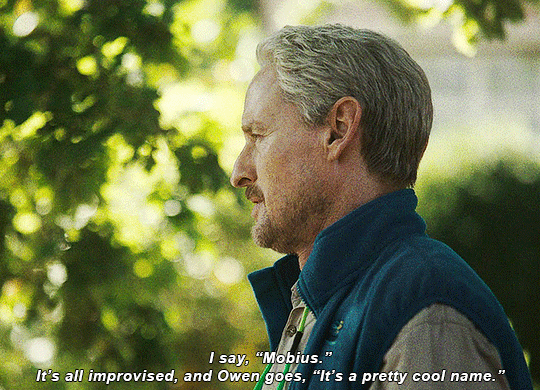
In S2E5, it’s interesting that “good” in this narrative is defined as a heteronormative fantasy of a house, two kids, and (possibly) a puppy and a snake. The “good” in Mobius’s original timeline, however, is imperfect. There is a partner that is missing (partners being a recurring theme in the series, particularly in S2E3), pronounced gone not once but twice. The entire scene between Don and Loki has been discussed at length by many, so there’s no need to reiterate it here. However, let’s bring our attention to Mobius’s avoidance of this “good” because this avoidance resonates with another queer experience.
The TVA, for Mobius, is the place where he studied, saved, and developed a close relationship with Loki. The fear of the “something good” is the fear of being confronted with something Mobius “should” want more than the TVA, and therefore “should” want more Loki. The fear is wanting something (or feeling pressured to want something) other than a queer relationship with no children. The question of “choice” is impacted by what is considered the “norm”.
S2E5 very pointedly focuses on the concern of choice, especially Mobius’s choice, in the bar scene between Loki and Sylvie. “Mobius should get a choice now, no?” At this point, Loki’s regard for Mobius has finally caught up with the romantic nature of Mobius’s feelings for him. And Loki, living his own queer experience, is also afraid of his true desires like Mobius. In being part of the intersectional queer community, the psychological need to guard against disappointment is high and commonplace. Desires are easily disappointed by the expectations of oppressive social mores. This survival tactic manifests itself with our hope and heartbreak with mainstream media, Loki the series being among them.
But Sylvie, the harbinger of true and absolute freedom, takes on the role of supportive ex and challenges Loki to answer Mobius’s question in S1E1: “What do you want?”
In this, Mobius and Loki’s individual relationships with the TVA are identical. It was never about where (the TVA), when (time works differently at the TVA), or why (the timelines). It was about who. It was about each other. The TVA represents a liminal space which became home by virtue of the people who brought love into it. The TVA is code for Loki and Mobius when each speaks of it.
Again, the artists behind the media must self-censure. In this, Loki also self-censures while giving the truth. “I don’t want to be alone. I want my friends back.” It cannot be denied that Mobius is Loki’s first truest and closest friend. “I don’t want to be alone. I want Mobius back.” Sylvie appreciates and validates this desire, but also points out that showing the TVA is something that cannot be unseen. The implication of this response suggests that Sylvie believes that Loki’s friends will feel compelled to join the TVA out of moral pressure. She reiterates the true lives that are being lived, and Loki, loving his friends, loving Mobius, elects to not take that away from them. “You are just fine without the TVA.”
Yet, Loki must choose an act of profound selfless love to save everyone. In doing so, he saves and frees Mobius in the way Mobius saved and freed him. The tragedy and, once again, poetic irony is that they both would have chosen each other. In giving everyone freedom, the true freedom of Loki and Mobius is sacrificed. This double-standard reflects in our reality between those who identify as cis and heterosexual and those who do not.
When Mobius looks at his timeline in S2E6, he does so for one reason: that timeline survived because of Loki’s sacrifice. He must honor that sacrifice and see what Loki protected. Mobius appreciates what he finds, but he doesn’t belong there. It is not what he ultimately longs for. And there must be worry, shame, in recognizing he would prefer to give up the house and two children if a life with Loki were a viable choice.
We all experience loss in our lives. Loss without a goodbye is also commonplace but is another pain that is more acute within the intersectional queer community. I speak of missed opportunities for happiness due to external forces. I speak of loss of self. I speak of loss of friends and family and home. I speak of death, losing a loved one without a goodbye, because same-sex lovers are not considered next of kin, an impossibility without marriage. Marriage echoes back to Don, who has no spouse, and Mobius, who has no partner.
#asks#loki#mobius#lokius#loki season 2#loki series#loki meta#my meta#loki analysis#my analysis#queer community#queer#queer representation#queer relationships#lgbt representation#lgbtq community#lgbtqia
244 notes
·
View notes
Text
Congrats to the fans of the wee woo show. I don’t go here but it makes me happy to witness how this arc for Evan Buckley got to bloom and I’m happy because I hope this reflects another shift in the TV industry.
For some media commentary context for you: ABC network is owned by Disney. Fox network was owned by Rupert Murdoch. So I can see how the network change for 911 can easily be a factor on how this got greenlit, after years of creator Tim Minear’s intention to work in hints, on the off chance he could take it there. (I don’t go here, but I did my reading). Oliver Stark who plays Buck also revealed he's been for it and couldn't say anything, until he was sure they could do it, until it aired and was out there. (*steeples fingers*)
For further context, Bob Iger—with George Lucas’ vocal support—just fended off a right wing coup on the Disney board from the kinds of people (like Peltz) who complain “why do we need so many female leads” “why do we need movies with all Black leads.” While it doesn’t mean Disney is no longer an evil megacorp, I’m pointing out that its CEO defended inclusive Disney brand content to the shareholders and the board, as well as dismantling the idea that it can’t be entertainment while being diverse.
The ripple of this goes outside of the wee woo show fandom. I’m seeing the joy on my dash from people who don’t watch the show or don’t watch it regularly, as well as from people who have been watching a long time and noticed things and realized there was a progression and it was there all along, and I know how much this must mean to a lot of people. With the world being how it is, with what people are facing inside the US from the far right, in their real lives.
It’s very hopeful in general for inclusion levels on a major network TV show, owned by a big evil megacorp. Representation matters.
Also I'm aware the wee woo show already had a queer couple, plus it's already an intersectional inclusive series, that’s great.
There shouldn't be limits placed on inclusion though. “But you already have X” shouldn't be weaponized to tell people to shut up. There is no “enough” or “too much” when it comes to inclusion. While I'm not for undermining the inclusion that's there, I've seen that weaponization used with a series that hasn't been great on inclusion, and I've seen that weaponization used for 911, which is. It's a sus argument.
Indirect and unintentional as it is, also bi Buck shut down every concern troll, every gaslight, every denial, every rationale I've ever seen people deploy against bi Dean. Everything from people who don’t understand what bi actual means—“but he likes girls so he can’t be bi”—to “but he wasn’t declared bi from the start of the show so he can’t”—yes he can and the wee woo show just did. On one of the original big three networks. Or people who say it would "ruin the character." Really? “But he’s an action hero”—so what? Evan Buckley is a hero, Dean is a hero, both badass action heroes. “People who see this as canon are delusional”—Evan Buckley went O RLY? Not so delusional now, is it.
Evan Buckley avenged bi Dean.
It’s self-evident. It’s right there. Different show, different network, but the concepts are familiar, the situation has a certain familiarity. This turn of events on an ABC show didn't just make bi Dean fans valid. bi Dean fans were always valid, the bi Dean reading was always valid. But I appreciate how much what happened on the wee woo show bonked people with a truth stick, about self discovery, character arcing, queer readings, queer coding, and the validity of merely noticing things.
147 notes
·
View notes
Text
i think i've said this before but i want to elaborate on it. i genuinely feel like the spop crew wrote c//a as some sort of torture p*rn. they know that people usually find an enemies to lovers arc sexy and intriguing. but the problem with c//a was that their fights were never equal. i don't know about y'all but when i think of enemies to lovers, i think of a dynamic where both individuals are at least somewhat on equal footing. i don't think about a relationship with a huge power dynamic where one of the characters is helpless and weak while the other takes every opportunity to torture them.
adora never tried to harm catra apart from self-defense, she always held back when she was fighting catra. she tried to reason with catra or just hold her off. meanwhile catra never held back on hurting adora. not once.
and all of this is framed as “hot”. it's framed as “sexual tension”. it's framed as “gay pining”, even though it's not. not to mention, most of the “homoerotic” fight scenes are where adora is either weak or helpless in some way. she's either restrained or too scared to fight back or actively stopping herself from injuring catra. and catra takes advantage of her kindness.
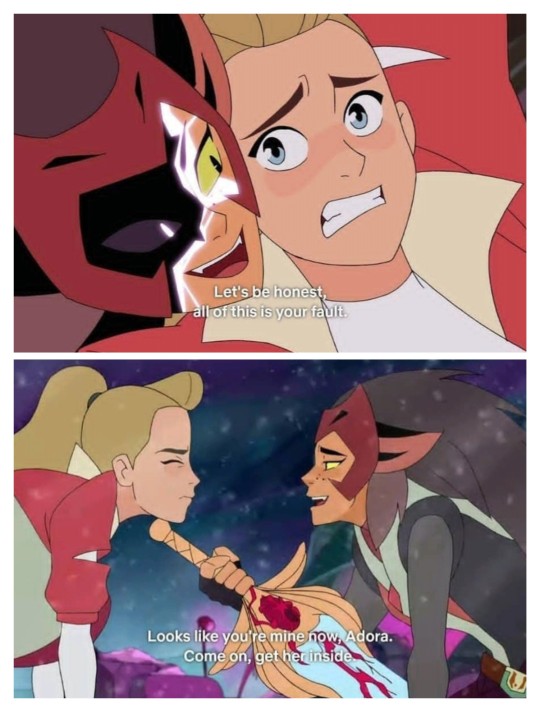
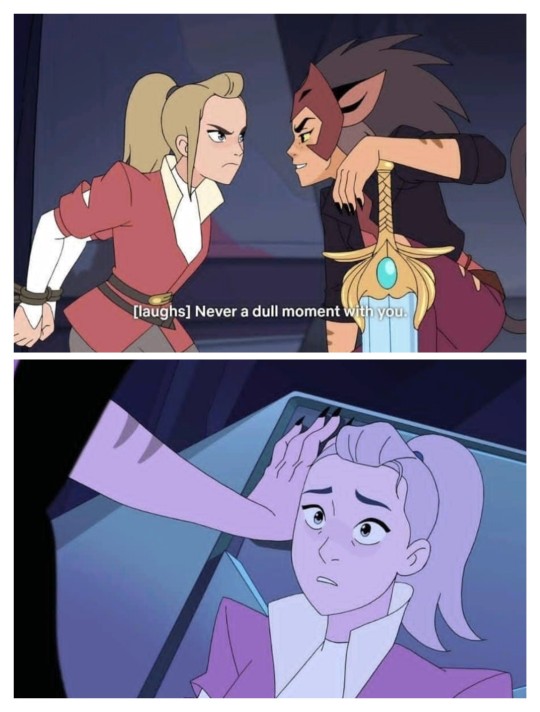
so what's the torture p*rn part of this? well. torture p*rn is basically a trope where a person (or multiple people being tortured) is the main attraction of the plot. c//a is supposed to be enemies to lovers, meaning they should be fighting equally, right? especially since adora is stronger and the “chosen one”, you'd think she'd definitely be defeating catra a lot more.
but no, most of their conflict is catra taking joy in harming adora. these scenes are framed in a more “intimate” way, with catra often touching adora without consent, saying vaguely flirtatious yet threatening one-liners and overall fueling the whole “sexual tension” part.
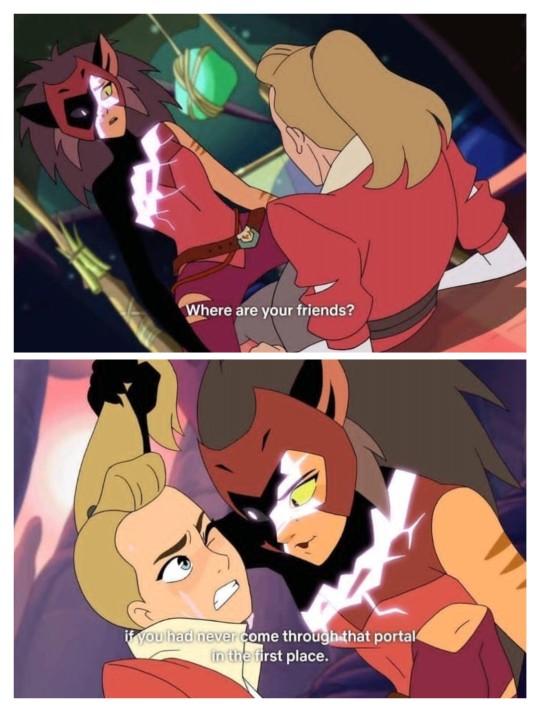
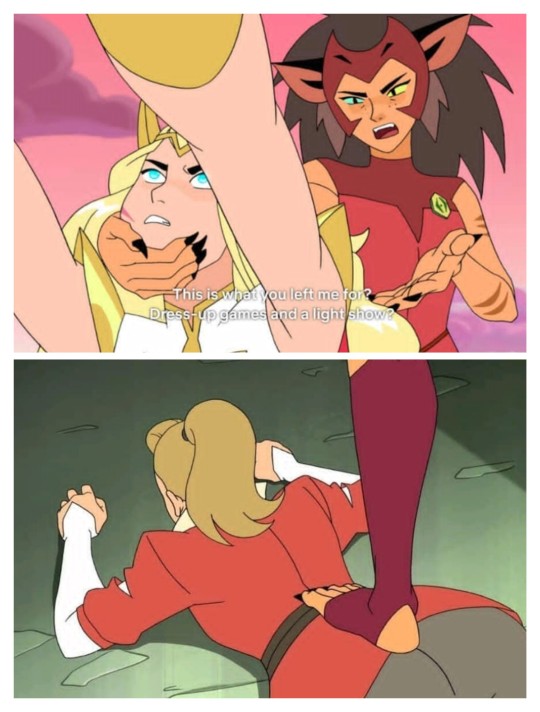
just take a look at these scenes. i can't completely blame the fandom for thinking these are sexy or erotic because they are framed that way. the crew themselves have admitted that c//a were supposed to have some sexual tension (despite being teenagers for at least two seasons, mind you) and it shows. adora may look scared or uncomfortable but it doesn't matter because the writers wants us to think that this is hot.
villains being creepy and borderline perverted is not a new thing, it's something that mainly came with queer-coding villains. but people often only do this to villains who are supposed to stay villains. and especially with the context that catra supposedly “loved” adora during all this, it just adds another layer of discomfort. it just feels like catra is taking the opportunity to not only hurt adora but also make her deeply uncomfortable by touching and interacting with her in a way that she did not consent to.
keep in mind that whenever adora has the upper hand, the show never frames their fights as homoerotic or weirdly intimate.
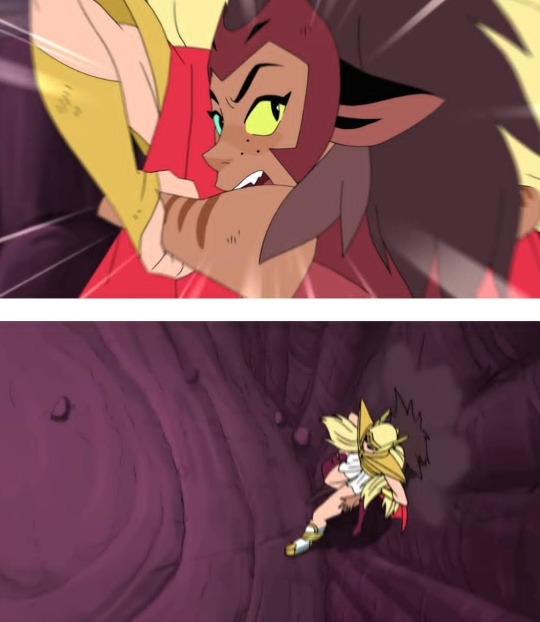
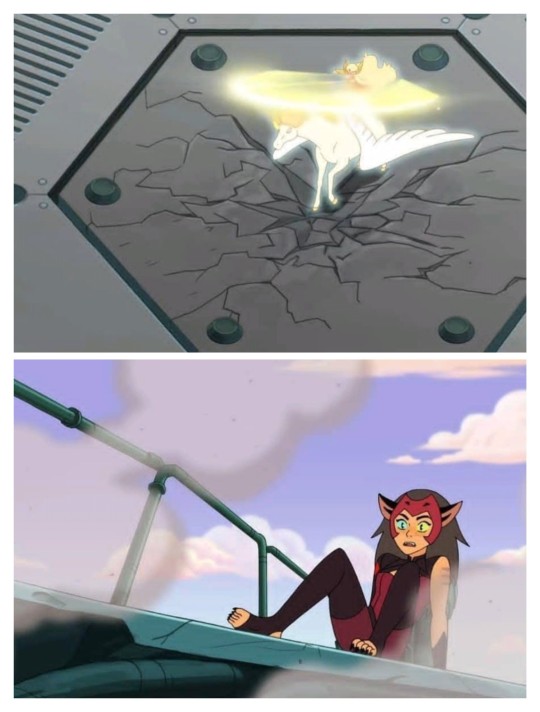
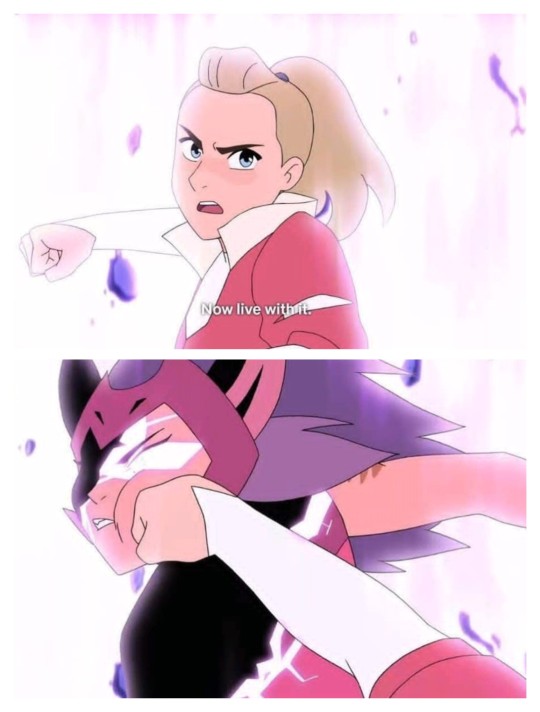
most of the time, she uses long range attack or she just goes on defense. the one time she attacked catra head on, she just decks catra in the face and is done with it. she doesn't cross catra's boundaries, she doesn't act flirtatious or touch catra inappropriately. the only scene where she can be described as “flirtatious” (though i would say she was just being smug) was when she wasn't attacking catra, but instead destroying one of entrapta's robots.
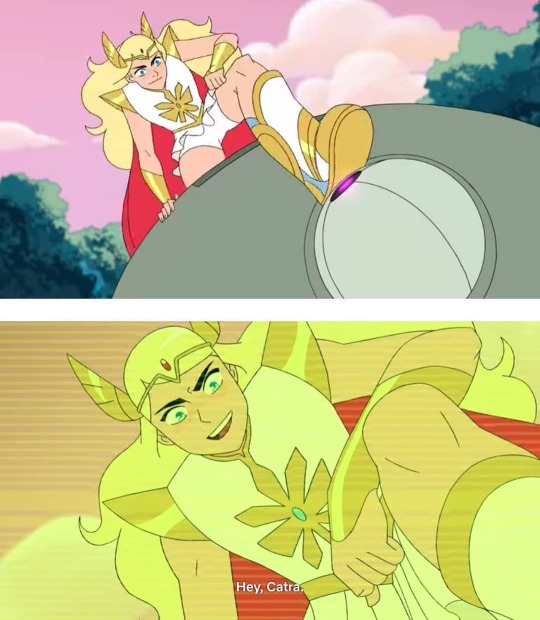
(and of course with no remorse, catra orders entrapta to activate the self-destruct on the robot so that adora could be blown to bits.)
so yeah. just because catra is a villain doesn't mean she has to be a creep. if the goal was to make her sexy (which is still weird since she was a teenager but regardless), there are other ways. there have been plenty of villains who are attractive and have a charming personality without being a total creep to the protagonists. for example, azula from ATLA is widely known as a queer awakening for many young girls because of how attractive she was (i know she was also a teenager. these are not my words, i'm just quoting the general public). and yet, you never see azula being creepily intimate with any of the protagonists. she often used long-range attack and she only goes as far as using some condescending language. it's just weird to write a villain who we should sympathize with, but then also make them a total creep.
#spop critical#spop#spop salt#spop criticism#spop discourse#she ra#anti catradora#anti catra#anti c//a#anticatra#antic//a#anticatradora#anti spop
156 notes
·
View notes
Text
Rating Ted Lasso Characters Based On If They'd Respect My Pronouns (Correctly)
Roy "We Stayed At GAY Til 3AM And Then We Had Crepes With Some Drag Queens" Kent: 11/10 no fucking shit. He would defend me from misgendering also, even if we weren't friends. He's the very embodiment of that guy who fought the trans guy and then fought the authority figure who scolded him for hitting a girl.
Nate "Genius (Code for Autistic)" Shelley: 11/10 are you kidding. If only quarantine had happened in his universe he'd have pronouns too. Also his girlfriend obviously already does.
Jamie "Prettyboy" Tartt: 11/10 duh. No, he doesn't know off the top of his head what part of speech a pronoun is, but only because nothing in the universe could matter less. And much like Roy, if he saw someone else being contrarian for the purposes of being a prick for absolutely no earthly reason, he would be eager to do something about it.
Keeley "Just The Tip" Jones: 11/10 did you see her. Never have I personally received more solidarity than from (butches and) full tilt Barbie Girl femmes like Keeley. She may be cis and she wears "women's" clothes, but she's still doing drag every day. She gets it.
Colin "Right by This Pink Triangle?" Hughes: 11/10 obviously. He would be so good at not making a big deal out of doing it correctly himself or correcting others, because he knows what it's like to just want to live your authentic life without being a spectacle.
Coach "You Should See Him In Drag" Beard: 11/10 which you should've guessed. Look at him. Look at him with your heart. You know he has pronouns you've never even heard of that he takes out for special occasions.
Ted "We Don't Not Care" Lasso: 11/10 why is this even a question. Practically the entirety of Ted's goals in life are to be respectful and kind and help others do the same. Sometimes that's hard and he fucks it up, but this is easy. C'mon.
Sam "Social Justice Warrior" Obisanya: 11/10 like. Obviously. I have nothing else to say, like. Obviously. Obviously.
Bumber-"Impending Class War"-catch: 11/10. If anything, given the opportunity, he would encourage me to have more pronouns.
Dani "Joy" Rojas: 11/10. These are getting very simple now, and require less and less explanation. He promotes joy. What else do you want.
Rebecca "Ask Your Daughter What It Means" Welton: 11/10. She's a cutthroat and a genuine feminist. She doesn't care if a bunch of freaks are scared of strangers' genitals, and she's certainly not going to let something so petty get in her own way.
Jan "I've Run Out of Fun Epithets For Everyone And He Wouldn't Mind This Unfun One That's Blunt About That Fact" Maas: 11/10 of course. There's no logical, moral, or social reason not to, and there is a wealth of evidence supporting gender affirming behavior.
Isaac McAdoo: 11/10. And he would (unnecessarily) instruct all the other lads to do it too. He might struggle with it at first if we had known each other previous to my transition, but not out of malice or negligence, and once he got on track he'd stay there for life.
Leslie Higgins: 11/10. He's a jazz musician with ten thousand gen Z children. He knows at least as many trans people already as any natural member of the queer community.
The Rest of The Lads: 11/10. We all know this to be true. Next.
Georgie Tartt: 11/10. Have you seen her son. She's prepared for this.
Sharon Fieldstone: 11/10. Have you seen her do her job. She's good at it.
Dottie Lasso: 9/10. Her heart's in the right place and that matters! She is inescapably Midwestern in both the good ways and the bad ways, though.
Jake: 8/10. Have you seen him do his job. He's bad at it.
Rupert Mannion: 6/10. He's a trans inclusive misogynist lmao. He also will treat correct pronoun usage as a privilege if he gets butthurt enough.
James Tartt: 3/10. He'd respect a trans man who performed masculinity to his standards, but he is definitely afraid of girlymen and women who are better than him (most women).
#jack facts#ted lasso#hc#i do vague sir but i do not vague at you sir#also yes i do know beard and bumbercatch's first names but i thought this was funnier
179 notes
·
View notes
Text
re: jianghu as a queer space in mlc
here to answer @redemption-revenge !! in reply to this post
(also tagging @markiafc @ananeiah <3)
there are many definitions of jianghu, but this is specifically based on the framing of jianghu as the space people retreat to, away from the mainstream sphere governed by the imperial court. in that is a sense of rejection and defiance against the patriarchal, heteronormative values and norms, which had been enforced through a fixation on upkeeping order in the society. as such i guess it's not too much of a stretch to interpret jianghu as a queer space in a way that's characterised by a spirit of nonconformity to the norms. consequently, it makes sense for stories set in jianghu be used to illustrate and navigate queer identities/experiences/feelings - which I came to believe mlc had made really good use of.
there's always kind of a dichotomy between 江湖 jianghu and 庙堂 miaotang (ie. imperial court). like in mlc, there are two separate, distinct law enforcement bodies from the respective spheres - and jianghu strives to keep imperial court from interfering in their affairs. like how li xiangyi firmly stands against getting imperial court involved in jianghu matters. like how fang duobing is actively running away from the grip of the royal court on his life choices. the rejection of the mainstream (very conveniently and broadly put, confucian) norms in mlc also manifests in many of its key relationships being non-familial (in the sense of blood/marriage-based kinship) and there being little emphasis on the main characters' biological familial ties. (anyway this is for a whole different meta on its own... edit: it's here)
it's then actually a sort of irony that the imperial court's institution of law and order is what sigu sect/baichuan court had been formed to be a de facto counterpart to. so when li xiangyi becomes li lianhua, it triggered the process of deconstructing the meaning of installing such an institution and the need to maintain order to a fundamentally nonconforming space such as jianghu. mama fang's seemingly throwaway line of criticising li xiangyi and his mission is in fact the thesis statement in this particular reading of mlc's story: jianghu makes its own rules. nobody should dare to do it in its place.
now deprived of all means to fight like he used to, li xiangyi's new life as li lianhua is essentially a refresh of how he views jianghu. the death of li xiangyi the leader of sigu sect and top of wulin, meant taking apart the idea that jianghu is a lawless arena where the fittest fight to the top for power and control over wulin. and li lianhua then putting together lotus tower, living a life focusing on a domestic lifestyle this time for real far from the reach of the governance both from the imperial court and sigu sect/baichuan court, is him living the jianghu that's defined as a space away from any form of conformity.
with that, there's also a sense of queerness to this particular way of living as li lianhua, if you consider the chinese conceptualisation of gender being more social than biological. if femininity and masculinity were respectively characterised by inner/domestic sphere and external/any space outside of that, dare I say...it actually makes li lianhua's moving house mindblowingly smart as a metaphor for gender fluidity. lonely wanderers are common in wuxia but housed lonely wanderers? he carved for himself a domestic (ie. feminine) space in the wilderness - among a jianghu space that's still dominated by masculine values of aggression and competition. and being freely mobile makes this feminine space more fluid and less tied down than the more rigid, inert domestic, feminine spaces in traditional mainstream society. when you combine it with how his character has been fem-coded - even as li xiangyi (eg. yin-coded powers/energy) (also a whole other meta on its own... edit: it's here now), it speaks to a part of him that has always found appeal in qualities conventionally associated with femininity of stability, gentleness and non-aggression. and a rejection of expectations to fight and destroy. he is defining who he is in his own terms, in the true spirit of jianghu.
#莲花楼#mysterious lotus casebook#my posts#lhl#lhlmeta#jielin writes something#also ofc the queer reading wrt defiance against norms in the way of choosing jianghu extends to fdb (and dfs?) individually too#fdb. ace. in particular#this meta can go longer. so much more to be said. but i was committed to posting it before i go to bed#but i'll say here first that i think it's the femininity in lxy that is what precisely makes him an unparalleled swordsman. not in spite of#apologies if it doesnt make any sense or just going off tangents in general lol it's 2am#struggled supremely writing this. for hours i was mind to mouth.meme#i sound batshit insane by the last part but at least that idea had been somewhat peer reviewed by my lovely friends...........#mark and ana don't read though before yall finish the show#also this is what happens to ur brain when ur other media obsession is a hardcore confucian critique/deconstruction#of a royal court intrigue story
126 notes
·
View notes
Text
one thing i am so grateful for in utena is that it refuses to demonize gender nonconformity or butchness… so many stories with a character like utena would present her wearing the rose bride gown at the end as a Positive Good because “Let Women Be Feminine!!!! and wear dresses and makeup and skirts!!!!!! #girlboss!!! 👛👗🎀🛍💄”
it is rare to find media that includes masculine women/gnc people to begin with, but it feels like stories which present our existence with any nuance beyond “just a phase” or “toxic masculinity” or “man hater” are all but nonexistent.
and yet the first arc culminates in utena trying to conform, trying to be normal, trying to be feminine — not because some teacher dress-coded her with a written rulebook, not because she realized that her gender-nonconformity was ~a phase~, but because she was manipulated in a much subtler and damaging way. she was told over and over again that she could never be good enough as a “prince”, that she could never have agency or fall in love with a woman or try to protect the people she cares about, because she’s a “girl”. and that arc resolves thanks so much to the love of other queer women: wakaba loves her enough to call her out when in any other story she would be giving her the “makeover”. juri gives utena her sword from one gnc person to another when in any other story she’d be the mean bullying lesbian who’s #notlikeothergirls. and instead of becoming the image of a good straight gender conforming woman, utena uses that queer love to reclaim her true self.
i love utena because she’s not a good, palatable gnc person. she’s not the palatable tomboy that’s gender-conforming in every way that matters and especially not a Gross Yucky Lesbian. she presents masculine. she acts in ways that are scolded (and admired!) for being too “boyish”. utena self-refers using masculine pronouns. she’s called “girl-boy” in a way that felt very true to my own experience growing up. she wants to be a prince, not a princess, and eventually she abandons those gender roles completely. she falls in love with a woman and loves her enough choose her, and enough for her to save herself. i just love utena.
#just. ugh#i feel like this is such a common experience for queer folks too#like trans people lesbians butches etc etc etc#rgu#rgu spoilers#rgu meta#utena tenjou#revolutionary girl utena#shoujo kakumei utena
371 notes
·
View notes
Text
having aromantic feelings in this denny’s tonight bc i had to go on a blocking spree yet again.
I just think like... people don’t know shit about what it’s like to be aromantic. aphobes complain about the Fandomization Of Pride and say shit like “asexuality is basically a fandom thing; if your community is entirely online and based around tumblr tags and headcanons, you cant possibly compare it to actual real life gay experiences”
and like. i have some bad fucking news for you about gay people who live in super homophobic backwater small towns. I’ve known plenty of gay people who were completely closeted irl and whos entire interaction with queerness was online communities, especially gay shipping. that doesn’t mean there aren’t other gay people in those homophobic little towns, its just often too dangerous to look for them. there are definitely other aro people in my backwater little town! I just can’t find them. I’m not saying this is the best way to interact with the queer community! or even a good way! for instance, nobody gives a shit about gay vs aro or bi vs pan irl! this drama is all internet shit! but being terminally online is certainly not a problem unique to aspec people.
honestly, as someone who’s trans, bisexual and aromantic, the thing that’s actually made my life the most difficult for cishets to swallow is the aromantic part. my backwater town is fairly liberal, so they can be chill about the gay thing, they can even tolerate the trans thing, but not getting married???? what do you mean you can’t be like the sweater-wearing chaste gay dads in the commercials? what do you mean you don’t want to date but you still want to have sex???????
nothing about my identity is palatable. nothing about me is relatable or marketable. my life, my future, my happiness, looks completely alien to your average cishet. the first time I told someone irl that I was aromantic, the immediate reaction was “oh my god I’m so sorry” as if I just said I had cancer.
like. actually. yknow what. yeah I think the aromantic experience is very easy to compare to my experience as a disabled person. its because I’m fundamentally missing something that Typical People consider completely intrinsically tied to their worth and their happiness. what’s the point of life if you can’t get married? whats the point of life if you can’t have a job? “i’m so sorry to hear you’ll never experience the be all end all of human existence; retiring to live comfortably with your aging partner as your grown children take up the mantle of your legacy.”
people don’t know what its like to be aromantic. they think of it as a tumblr tag, or headcanons, because the only time they bother to interact with aromanticism is when they’re complaining about our headcanons. no one can deny that aspec identity in this decade is intrinsically connected to the internet, in the same way that no one can say that gay identity in 1970s and 80s america wasn’t intrinsically connected to gay bars. its because That’s How You Meet People. queer people have always taken whatever was the current way for humans to connect to each other and carved out their own space.
aromanticism is in the stage where its hard to find other people, and no one knows what you are, and if you explain it to them they think you’re sick. we’re in the stage where we don’t get a lot of explicit canon representation, we have to scrape by on aro readings and subtext and coding.
and it IS coding! its coding! I don’t care if aromanticism wasn’t named yet back then! there are plenty of instances of queer coding from before we had words like “trans” or “gay” or “lesbian” or even “queer.” what matters is that someone somewhere was like “this character has the experience of not feeling the socially mandated attraction to the opposite binary gender,” which is a queer experience whether the person feeling it is gay or aromantic. just like bisexuality and lesbianism weren’t separated for a long time because straight society didn’t care if the wlw could also technically like men, lesbianism and aromanticism and asexuality weren’t separated because straight society didn’t care if the woman who wouldn’t get married to a man wanted to kiss girls or not.
this is way longer than I intended it to be and it got kinda rambly and train-of-thought, and I don’t think I really have any particular conclusion here. just aro feelings. idk if this makes sense but I’m tired of trying to edit it to make more sense so I’m just hitting post
#actually aromantic#actually aro#aromanticism#alloaro#actually autistic#aspec#aphobia mention#queer#queerness#long post
2K notes
·
View notes
Text
Rizzoli and Isles is actually a show about a Queerplatonic Relationship.
Okay hear me out.
So, I always have shipped Rizzles. There are many MANY ways in which these are queer coded characters with a heavy romantic subtext, that a lot of the time honestly bleeds into the maintext. A lot of the actions and dialogue that we would typically interpret as romantic, especially between a hetero pairing, certainly works for this show.
But I did a re-watch of the show recently, and while I still ship them romantically, I actually think what is being portrayed between them is something else. They are DEFINITELY more than friends; I mean they are life partners in every sense of the word. But the kind of dynamic that is CANONICALLY portrayed between Maura and Jane, is in fact, a Queerplatonic Relationship.
So here’s a working definition of the term for those who aren’t familiar with it:
Queerplatonic relationships and queerplatonic partnerships are committed intimate relationships which are not romantic in nature. They may differ from usual close friendships by having more explicit commitment, validation, status, structure, and norms, similar to a conventional romantic relationship
I have actually experienced something like this, (and yes I’m going to get a bit anecdotally personal here; I’ll try not to be too long winded, but it’s relevant, I promise lol):
I had an (unspoken) kind of relationship like this with my best friend in my early/mid 20s. We have been best friends since I was 11, but something definitely shifted when we became adults, and I have to say, I ended up, quite unexpectedly, being deeply in love with my best friend...platonically. I didn’t want to date her. I didn’t want to sleep with her. But, I was totally devoted to her and we were each other’s person for years. We were each other’s assumed plus one for everything, we regularly did dinner dates, we gave each other super sentimental cards and specialized gifts on birthdays, we also regularly did domestic shit together like grocery shopping, errands, chores, house projects; you name it, we had it/did it. I mean we were even each other’s phone background for a while lmao. We never lived together, but we had keys to each other’s places.
Now a lot of this shit can happen and does happen in standard friendships (maybe not the phone background thing; that was super gay ngl hahaha), but the thing that made this different was the level of assumed partnership going on between us. And the...energy. We would stare deeply into each other’s eyes. We had that magnetic kind of magic with each other, like no matter where the other is in the room, we find our way back to each other. And people literally perceived us as a couple. Hell, my other friends teased us about it.
Any of this sound familiar?
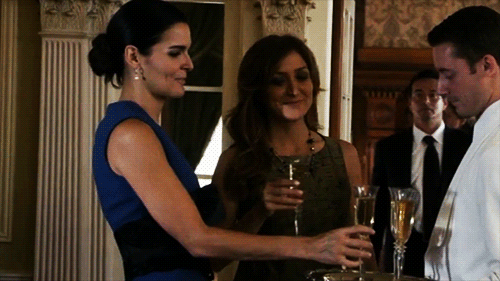
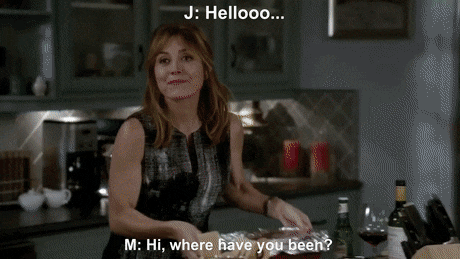

Oh and I DO find her to be attractive and even sexy. And we flirted (still do lolol) a LOT.

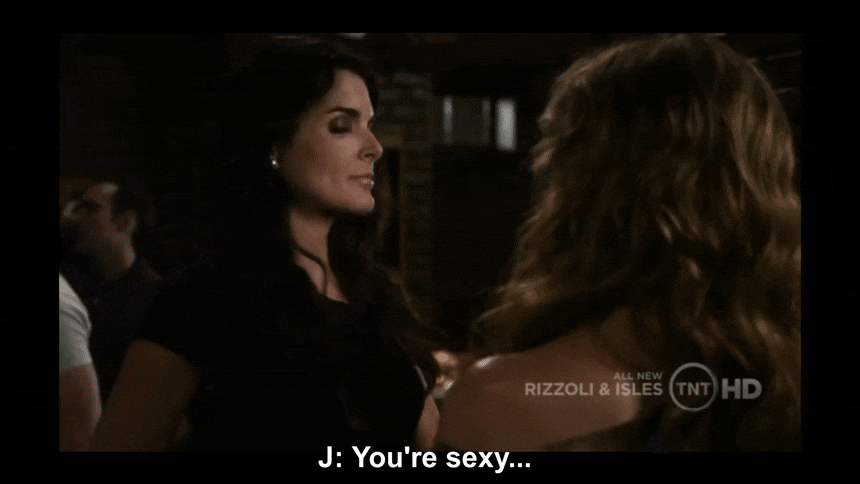
But I didn’t ever really.....actually want to have sex with her. Not that I would’ve even necessarily been opposed to it, because we were so close, but it just, wasn’t ever a desire for me.
This was interesting to experience, because I do identify as a lesbian, I have been romantically attracted to people, sexually attracted to people, and the two, as society expects, do usually go hand in hand for me. But with her, I honestly could’ve seen forever; like being exactly as we were, as life partners, I could’ve even seen myself raising kids with her, and I would have been TOTALLY, GENUINELY content with it, ‘cause my relationship with her filled me up in a way nothing else has. This was confusing as all hell to me for a long time, because I didn’t have a name for this until recently when I learned about the concept of Queerplatonic Relationships which again supersede friendship and often are life partnerships, but aren’t inherently romantic or sexual, even though they are quite deep. I actually think QPRs speak to that “limitless” “otherwise undefinable” kind of relationship dynamic.
Sooo - and I promise I’m wrapping my story up - when my bff met her current boyfriend, which is her first super serious adult relationship, I didn’t quite experience jealousy, I mean I always envisioned a romantic partnership for her, and I still want that for me! Buuuut...my feelings were complicated because it’s like...I had to mourn what I lost, as our dynamic inherently changed, and the fact that I wasn’t her person anymore. Weird thing to process indeed. Also *ahem* SOUND FAMILIAR?
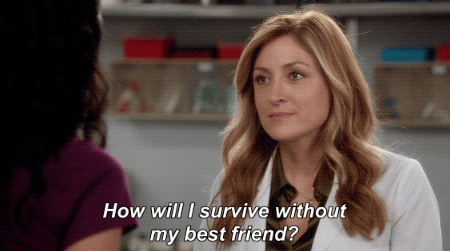
Without getting too carried away here (oh who am I kidding, I already have 😂) for comparison’s sake, I actually went through a crazy ass heartbreak with someone, also while I was in my mid 20s; someone to whom I WAS romantically, sexually, spiritually, connected and attracted. I mean I was IN LOVE with this woman and she broke my heart by not fully reciprocating my feelings and not wanting to be with me. I thought I was gonna die when we stopped talking. Hell, it’s been years and I still think about her.
But if you were to ask me who the true love. of. my. life. has been so far...I’d pick my best friend!
The funny thing is I think a LOT of women end up in these kinds of dynamics, ESPECIALLY queer women, maybe even more so queer women who form super close relationships to “straight” women (gotta put str8 in quotes ‘cause...this shit is inherently queer even though it’s not romantic/sexual). You all know what I’m talking about; You’d do anything for each other, there’s chemistry, connection, and care, yet it doesn’t quite fit into any box you try to give it. People read you as a couple. You know this about yourselves, and you just...accept it. Because what you have is actually beyond any label. You know?
Anyway, I think there’s actually something cool and radical about this and I know that queer people want and deserve romantic and sexual representation, but I think this IS an accurate kind of representation that happens all the time that isn’t appropriately covered or discussed in media.
In hindsight, I think that’s what really hooked me on R&I. I mean, I started watching ‘cause I thought they were lesbians, and I kept watching ‘cause I thought it would be canon! And yeah, I still think about what could’ve been with them: fanfiction is good for that. But why do I still watch the actual show? Well...I LIVED it.
Now: do I think that Maura and Jane often tip the scales a lil’ TOOOOO far in the explicitly gay direction on this show? Oh hell yes! Do I think you can interpret them as two people who are madly in love, romantically, with each other, yet are too scared to do anything about it? Oh hell yes! Like I said I do ship Rizzles. BUT, if I’m honest about what is FULLY, CANONICALLY being portrayed, no subtext, ALL maintext: It’s 10000% a QPR.
So no: Maura Isles and Jane Rizzoli are certainly not JUST friends. They aren’t just colleagues, although their work relationship is just as powerful and awe inspiring as their personal one. They aren’t really like sisters, although they can quarrel like siblings at times. They aren’t truly romantic, although they are essentially life partners. They aren’t in a sexual relationship with each other; not that it couldn’t go there, but I also see how it wouldn’t need to go there, and how that doesn’t diminish the bond at all. They have something that I recognize -and something I think perhaps many of us recognize too- something beyond definition, because at the core of it they are true-blue soulmates who share a kind of unconditional love that is rarely found in ANY kind of relationship. If there is a definition that comes close to summing this kind of thing up: Queerplatonic Relationship is the answer!
Idk just felt like sharing this. Thanks for reading 🤓
#rizzoli and isles#rizzles#maura isles#jane rizzoli#maura x jane#queer platonic partners#queer platonic relationship
286 notes
·
View notes